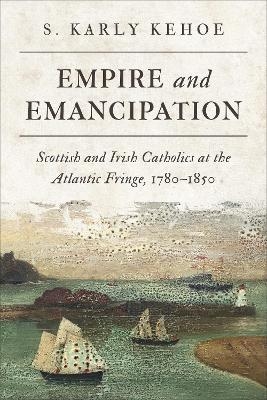
Empire and Emancipation
Scottish and Irish Catholics at the Atlantic Fringe, 1780-1850
Seiten
2022
University of Toronto Press (Verlag)
978-1-4875-4107-1 (ISBN)
University of Toronto Press (Verlag)
978-1-4875-4107-1 (ISBN)
- Titel ist leider vergriffen;
keine Neuauflage - Artikel merken
Drawing upon the experiences of Scottish and Irish Catholics in Nova Scotia, Cape Breton Island, Newfoundland, and Trinidad, Empire and Emancipation sheds important new light on the complex relationship between Catholicism and the British Empire.
Empire and Emancipation explores how the agency of Scottish and Irish Catholics redefined understandings of Britishness and British imperial identity in colonial landscapes. In highlighting the relationship of Scottish and Irish Catholics with the British Empire, S. Karly Kehoe starts an important and timely debate about Britain’s colonizer constituencies.
The colonies of Nova Scotia, Cape Breton Island, Newfoundland, and Trinidad had some of the British Empire’s earliest, largest, and most diverse Catholic populations. These were also colonial spaces where Catholics exerted significant influence. Given the extent to which Scottish and Irish Catholics were constrained at home by crippling legislation, long-established patterns of socio-economic exclusion, and increasing discrimination, the British Empire functioned as the main outlet for their ambition. Kehoe shows how they engaged with and benefitted from the security needs of an expanding empire, the aspirations of an emerging middle class, and Rome’s desire to expand its influence in British territories.
Examining the experience of Scottish and Irish Catholics in these colonies exposes how the empire levelled the playing field for Britain’s national groups and brokered a stronger and more coherent British identity. In highlighting specific aspects of the complex and multifaceted relationship between Catholicism and the British imperial state, Kehoe presents Britishness as an identity defined much more by civil engagement and loyalism than by religion. In this way, Empire and Emancipation furthers our understanding of Britain and Britishness in the Atlantic world.
Empire and Emancipation explores how the agency of Scottish and Irish Catholics redefined understandings of Britishness and British imperial identity in colonial landscapes. In highlighting the relationship of Scottish and Irish Catholics with the British Empire, S. Karly Kehoe starts an important and timely debate about Britain’s colonizer constituencies.
The colonies of Nova Scotia, Cape Breton Island, Newfoundland, and Trinidad had some of the British Empire’s earliest, largest, and most diverse Catholic populations. These were also colonial spaces where Catholics exerted significant influence. Given the extent to which Scottish and Irish Catholics were constrained at home by crippling legislation, long-established patterns of socio-economic exclusion, and increasing discrimination, the British Empire functioned as the main outlet for their ambition. Kehoe shows how they engaged with and benefitted from the security needs of an expanding empire, the aspirations of an emerging middle class, and Rome’s desire to expand its influence in British territories.
Examining the experience of Scottish and Irish Catholics in these colonies exposes how the empire levelled the playing field for Britain’s national groups and brokered a stronger and more coherent British identity. In highlighting specific aspects of the complex and multifaceted relationship between Catholicism and the British imperial state, Kehoe presents Britishness as an identity defined much more by civil engagement and loyalism than by religion. In this way, Empire and Emancipation furthers our understanding of Britain and Britishness in the Atlantic world.
S. Karly Kehoe is Canada Research Chair in Atlantic Canada Communities at Saint Mary’s University.
Introduction: Catholic Britons at the Atlantic Fringe
Part I: Identity, Catholic Relief, and Imperial Security
1. Catholics, Colonies, and the Imperial State
2. Imperial Security and Catholic Relief
3. Colonial Catholics and Constitutional Change: Developments in Nova Scotia and Cape Breton
Part II: Service, Education, and Political Influence
4. Engaging with Imperial Traditions: Military Mobilization and Slavery
5. Enabling Ambition through Education
6. The Decline of Lay Authority: Ecclesiastical Reorganization and Imperial Power in Trinidad and Newfoundland
Conclusion
| Erscheinungsdatum | 10.02.2022 |
|---|---|
| Reihe/Serie | Studies in Atlantic Canada History |
| Zusatzinfo | 13 b&w illustrations, 2 b&w maps |
| Verlagsort | Toronto |
| Sprache | englisch |
| Maße | 155 x 229 mm |
| Gewicht | 500 g |
| Themenwelt | Geisteswissenschaften ► Geschichte ► Regional- / Ländergeschichte |
| Geschichte ► Teilgebiete der Geschichte ► Militärgeschichte | |
| Geschichte ► Teilgebiete der Geschichte ► Religionsgeschichte | |
| Geisteswissenschaften ► Religion / Theologie ► Christentum | |
| ISBN-10 | 1-4875-4107-4 / 1487541074 |
| ISBN-13 | 978-1-4875-4107-1 / 9781487541071 |
| Zustand | Neuware |
| Informationen gemäß Produktsicherheitsverordnung (GPSR) | |
| Haben Sie eine Frage zum Produkt? |
Mehr entdecken
aus dem Bereich
aus dem Bereich
neueste Manipulationstechniken als Waffengattung der NATO
Buch | Softcover (2023)
Westend (Verlag)
CHF 33,55
Deutschlands Schwäche in der Zeitenwende
Buch | Softcover (2023)
C.H.Beck (Verlag)
CHF 25,20


